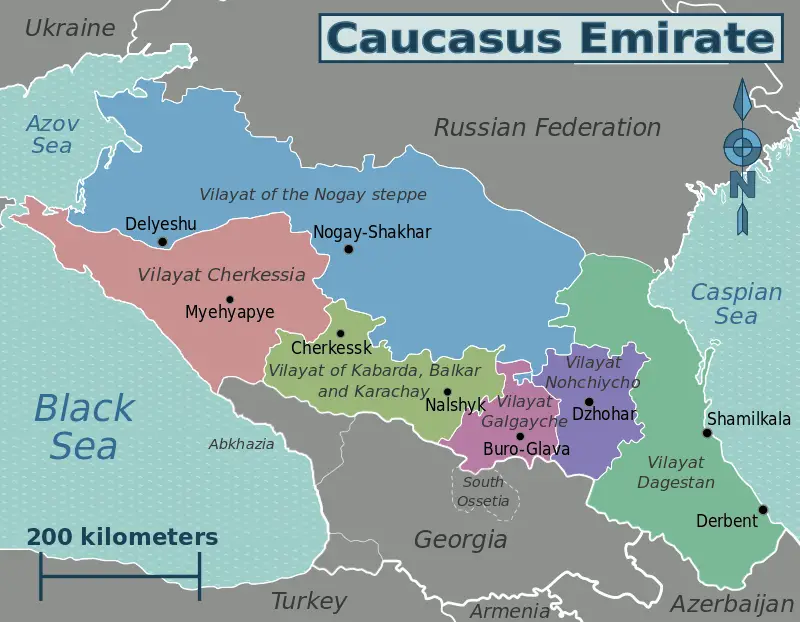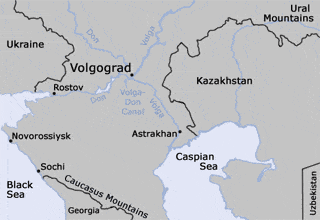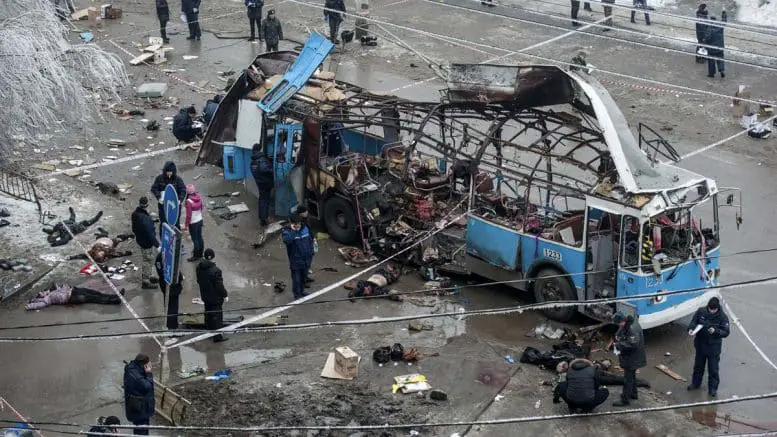I have seen several articles now comment on the reasoning that terrorists might have employed in choosing to target the Russian city of Volgograd three times in as many months. Many of these articles have posited the question in their titles and introductions, but most, it seems have fairly skirted the issue and largely concentrated on ideas outside of the specifics of “Why Volgograd?”
I would like to offer a brief and direct thought on this question to the discussion.
First, the attacks have been claimed by a terrorist group led by Dokka Umarov. Umarov is the self-proclaimed leader of his own self-proclaimed Caucasus Emirate. The Caucasus Emirate, if it actually existed, would consist of a generous strip of Russia’s territory around the Caucasus Mountain Range.

The Caucasus Emirate, as envisioned by Dokka Umarov.
Should the emirate ever try to gain its independence, it would have to fight against a much larger enemy – Russia, from which its land would need to be taken. Russia would have far greater resources and a much larger army than would be available to Dokka Umarov and his supporters. However, geography and the tenuousness of Russia’s transport system would give Umarov a fairly obvious strategy to pursue.
The Caucasus are effectively at the end of a peninsula of Russian territory, jutting out from Russia, bordered on the west by the Black Sea and the east by the Caspian. To the south is Georgia, which is not entirely friendly to Russia and Azerbaijan which is not exactly an ally either.
Russian transportation reaches the Caucasus by two major routes. One transport corridor runs from Moscow to Sochi in a fairly direct north-south line, passing through the major city of Rostov-on-Don near the point where the peninsula narrows and juts off from Russia.

Volgograd and its surrounding area.
The other route, which is much more concentrated and more strategic, runs through Volgograd. Volgograd is a major river port, rail hub, road junction, and growing air hub. It draws traffic from Siberia as well as Moscow and both the adjoining seas via rivers and canals. Volgograd is a major population center that also supports considerable militarily strategic industries: food processing, machinery, oil refineries, aluminum production, and more.
To confront a much larger enemy, it would be strategic for Umarov to disrupt Russia’s ability to move men and materials to the battlefield. Striking Volgograd’s transport infrastructure and possibly industry early in the conflict would be the most effective way to do so. Thus, Umarov, who has been involved in the military effort to separate the Caucasus from Russia for at least two decades has likely focused efforts on developing contacts and infrastructure in Volgograd. That Volgograd might have the strongest rebel presence outside of the Caucasus would not be surprising.
So, why was Volgograd struck? The major reasons that I’ve read are all likely right. First, it is a major population center close to Sochi, which helps cast doubt on Russia’s security preparations for the Olympic Games. Second, it is a target outside of Sochi, which will make Russia’s security forces spread thinner to try to protect more area, which may make future attacks easier in the region. However, I think the main reason is simply because the attacks could most easily be carried out there. The terrorists led by Umarov have very likely focused on Volgograd for years in developing infrasturcture and contacts.
The good news is that, despite the logic of concentrating forces on Volgograd, the terrorists were only able to strike very soft targets – two public busses (which essentially have no security) and a train station (where the bomb did not manage to get past security). Thus, while the terrorist cell has the ability to plan the attacks and build the bombs in (or transport them to) Volgograd, they do not have the ability to strike truly strategic targets. This indicates that they are not as powerful or well organized as an organization seeking the independence of a large territory would need to be in order to complete such a mission.
I would hazard the prediction that these three attacks do not bode well for the terrorists’ ability to break the “iron ring” that Russia’s security forces are placing around Sochi for the Games – or even perhaps to hit major targets in major cities like Moscow and St. Petersburg, where security is also now heightened.
Should there be other attacks, I would look for them to occur in more soft-target areas of Rostov on Don and possibly Astrakhan, which are also strategic to Russia’s ability to reach its southern Caucasus and where the terrorists may have also invested effort to develop infrastructure.


